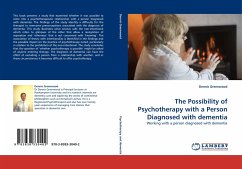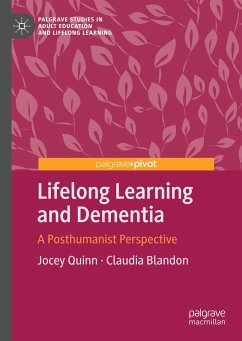
The Possibility of Psychotherapy with a Person Diagnosed with dementia
Working with a person diagnosed with dementia
Versandkostenfrei!
Versandfertig in 6-10 Tagen
52,99 €
inkl. MwSt.

PAYBACK Punkte
26 °P sammeln!
This book presents a study that examined whether it was possible to enter into a psychotherapeutic relationship with a person diagnosed with dementia. The findings of the study identify a difficulty for the therapist to overcome preconceptions associated with the diagnosis of dementia. This study illustrates what Levinas calls the non-intentional which refers to glimpses of the other that allow a recognition of separation and otherness that is not concerned with knowing . The association of theory with intentionality is identified in the findings and the possible impact on the practice of psyc...
This book presents a study that examined whether it was possible to enter into a psychotherapeutic relationship with a person diagnosed with dementia. The findings of the study identify a difficulty for the therapist to overcome preconceptions associated with the diagnosis of dementia. This study illustrates what Levinas calls the non-intentional which refers to glimpses of the other that allow a recognition of separation and otherness that is not concerned with knowing . The association of theory with intentionality is identified in the findings and the possible impact on the practice of psychotherapy noted, particularly in relation to the prohibition of the non-intentional. The study concludes that the question of whether psychotherapy is possible might be asked of anyone entering therapy. The diagnosis of dementia can have the effect of excluding a person from a relationship with another, and in these circumstances it becomes difficult to offer psychotherapy.












